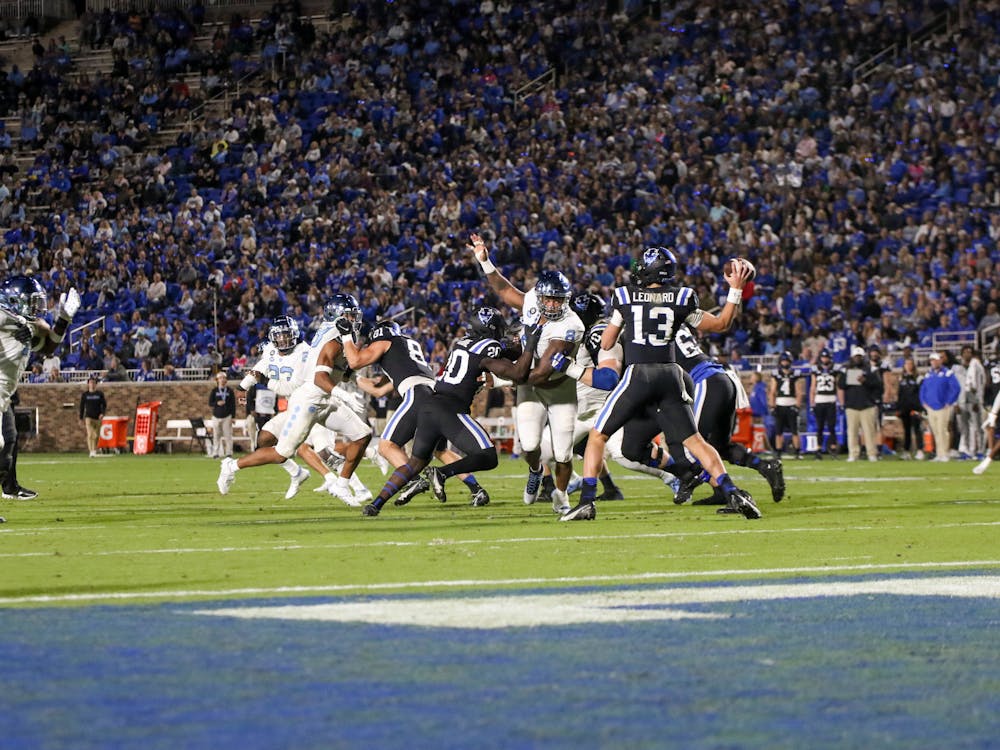There’s a principle every coach has to tell their players: you have to do your job better than the refs do theirs. The message is that you need to do everything in your power to win the game so that third parties can’t affect the outcome. Implicit in that is an understanding that the coaches will coach better than the refs will referee.
Saturday night, Duke head coach Mike Elko failed to live up to his end of that bargain.
With 2:09 left against North Carolina, the Blue Devil defense, holding a four-point lead, took the field against the Tar Heels’ offense. With Duke’s defensive unit having surrendered almost seven yards per play to that point, everyone and their mother (and in my case, their brother too) expected North Carolina quarterback Drake Maye to lead a go-ahead drive.
As a result, most coaches in Elko’s shoes would’ve made sure that the Blue Devil offense had as much time as possible to respond to that likely Tar Heel score. And yet, when defensive tackle DeWayne Carter sacked Maye on the third play of the drive, Elko let 13 seconds tick off the clock before North Carolina next snapped the ball. When Maye ran for 14 yards the following play, Elko let 25 seconds pass from Maye being downed to the next Tar Heel snap. North Carolina was 7-for-11 on third down to that point in the game; the best coaching strategy was assuming it would keep marching upfield, and to plan accordingly.
The Tar Heels did keep marching, and after Maye was tackled after a short scramble on first-and-goal, 11 seconds flitted away between the play being whistled and his second-down spike.
There’s an argument that if Maye wanted time to stop badly enough to run a spike, then Duke should have wanted the opposite, justifying Elko sitting on his timeouts. But when North Carolina scored on its very next play, it still had more than enough time to have run a fourth-down play if needed—the spike wasn’t to save time, it was to allow the Tar Heels to rest and to huddle.
In a game such as this Victory Bell instant classic, every second matters. So while 13 seconds here, 25 seconds there and 11 seconds over yonder may not seem like a lot, it adds up to time Duke sure could have used on its final drive. Consider the difference between the following:
- First-and-10 at the +47-yard line, 10 seconds remaining, three timeouts remaining; and
- First-and-10 at the +47-yard line, 59 seconds remaining, zero timeouts remaining.
That’s what the Blue Devils had on Saturday after Jordan Moore’s 28-yard catch to open their final drive, versus what they could’ve had if Elko had used his timeouts more defensively over the prior two minutes. Remember that a spike takes about nine seconds to run, but that the clock pauses after a first down and resumes when the linemen are set for the next play (if the clock would not have otherwise stopped anyway). So with the Blue Devils having averaged over seven yards per play to that point, and kicker Charlie Ham accurate out to about 40 yards, Duke needed time for three or four average plays to be able to tie the game.
Fifty-nine seconds is more than enough time for four plays. Ten seconds isn’t.
Get The Chronicle straight to your inbox
Signup for our weekly newsletter. Cancel at any time.

